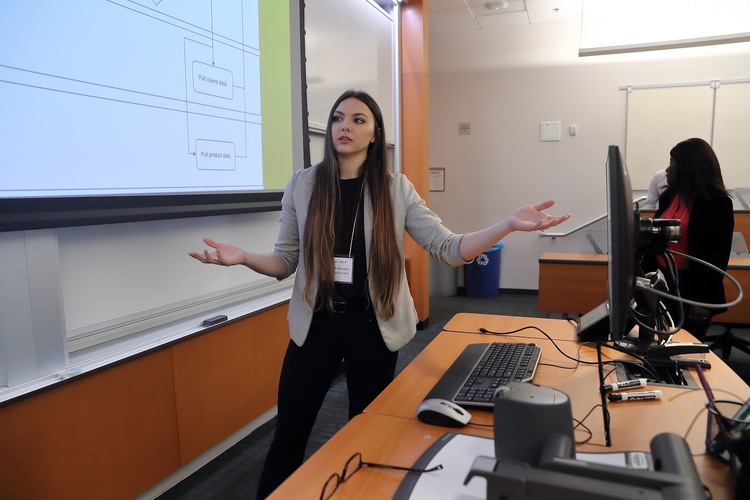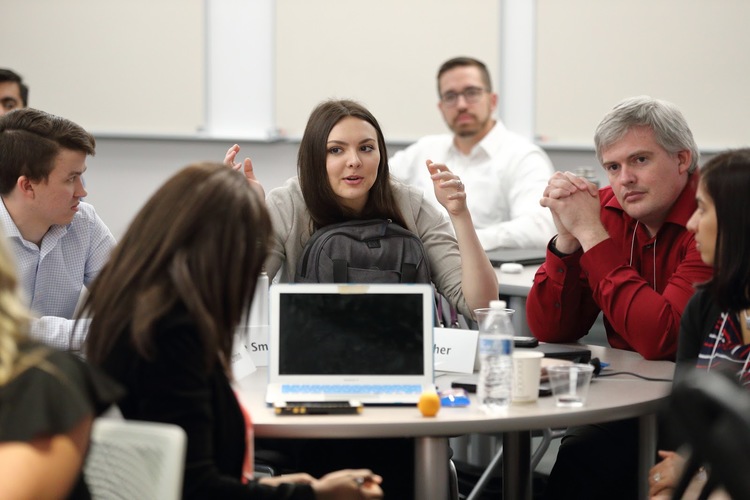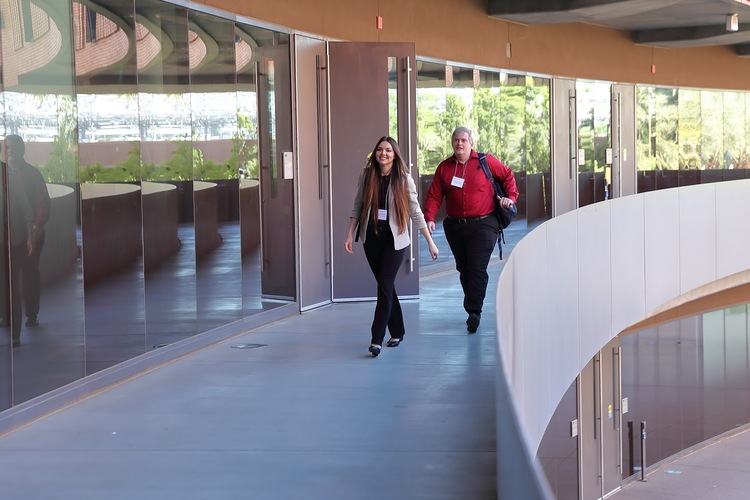blog article
Trading in Hospitality for a Career as a Business Analyst at Cognizant
![]()
Written By Liz Eggleston
![]()
Written By Liz Eggleston
Course Report strives to create the most trust-worthy content about coding bootcamps. Read more about Course Report’s Editorial Policy and How We Make Money.
Course Report strives to create the most trust-worthy content about coding bootcamps. Read more about Course Report’s Editorial Policy and How We Make Money.
Sarah Pinvises had 10 years of experience in hospitality and culinary world, but didn’t have the business experience to get her foot in the door as a Business Analyst. The Cognizant/ASU Digital Business Analyst Bootcamp turned out to be a recipe for success – it was free to students, the curriculum was online, and it guaranteed an interview at Cognizant after graduation. Learn how she earned herself a coveted spot in the program, rubbed shoulders with Cognizant execs and became a sought-after Business Analyst with Cognizant Consulting – all in less than three months!
What were you up to before you took the Cognizant/ASU Digital Business Analyst Bootcamp?
I have 10 years of experience in the hospitality industry. My mom was allergic to practically everything so, growing up, we rotated between the same five bland meals. Thus, I decided to pursue a culinary degree from East Career and Technical Academy while finishing my high school education. Since then, I’ve worked as a manager at Cold Stone Creamery, a barista at Starbucks, and a Bistro Manager at the Courtyard Marriott in Tacoma, Washington. It was never my intention to work in the culinary industry; it’s just where I found opportunities given my education.
Starbucks actually paid for my degree at Arizona State University – I have degrees in Global Leadership and Global Logistics Management. I also have a certificate in Applied Business Data Analytics (which I got before taking the Cognizant program.) I had the educational background to be a business analyst, but none of the real-word business experience.
I’m curious: what motivated your career change from hospitality and into business analysis?
I have always wanted to work in business but was having a hard time even getting my foot in the door. I got caught up in the culinary world. My husband is a consultant, so I learned about the consulting lifestyle through him. I was not interested specifically in business analysis as a career path until I had learned about it through Cognizant. ASU sent me an email about the Cognizant Business Analytics Bootcamp, and it struck me as a great opportunity. As I read more about the company itself, it struck me as a really good fit.
Had you tried to apply for Business Analyst positions before you went through the Cognizant program?
I applied to several purchasing manager roles – really anything related to supply chain. I did look at a couple of different Business Analyst roles but realized that recruiters often want either (a) an MBA or (b:) at least two-plus years of experience in similar work. Without either of those, it just didn’t seem feasible for me.
Because the Cognizant/ASU program is free to selected students and guarantees an interview at Cognizant when you graduate, I’m assuming that it’s quite competitive to get accepted. How was the application process for you?
The interview process was pretty extensive. As part of the initial application, they ask for a lot of information and a really brief essay. About two weeks after that, I made it through the initial screening process and had a phone interview with a recruiter to cover the basics of your background and your previous business analytics experience.
The final step is an interview with an actual consultant at Cognizant. From what I understand, there’s a low acceptance rate, so it’s fairly competitive. It was definitely a similar level of rigor and tenacity as a job interview.

Did your classmates have similar backgrounds to you? Was it a diverse class?
During the interview phase, Cognizant is looking for different types of students. Cognizant really values diversity; something you don’t really see at a lot of other companies. Other companies might say “Oh, you have 10 years of experience in culinary… what are you doing here?” Whereas Cognizant said “Ooh, 10 years in culinary… that might be valuable to our retail and hospitality clients!” The best way to move forward and generate good ideas is when you have a diverse group of employees working collaboratively, and Cognizant really understands that.
I know having a bachelor’s degree (or having almost completed a bachelor’s degree) is a must. An MBA or other technical skills are benefits. If you have experience in one of the major industries like Insurance, that’s an advantage. But if you don’t have those, that doesn’t mean you’re out of luck. A classmate of mine had been an elementary teacher for 14 years; had no business background whatsoever, and she is rockin’ her project right now. It’s not necessarily a matter of what hard skills you have, but more so the soft - and transferable - skills you can bring to the table.
What was the learning experience like once you started the Cognizant/ASU Program?
We had been told that we’d need to commit a maximum of 20 hours per week, all online. I found that sometimes it took a lot longer than 20 hours. Other weeks only took me 4 hours – that was an Excel week, and with my extensive Excel background, I breezed through that. Some of the assignments required group work so we were paired with a few classmates; others were individual assignments.
How structured were the 20 hours each week? Was there much room for flexibility?
Cognizant does understand that not everyone is working eight-to-five, so the expectation is that you study when you have the free time. But it was very structured in that you have a fixed amount of work expectations per week. In one week, you may be assigned a certain number of videos to watch, articles to read and deliverables to hand in. Group projects were a little more stressful because you have to coordinate with teammates who might have conflicting schedules. Open communication right from the start helps with that, of course.
Did you balance a full-time job with the Cognizant bootcamp?
I was a bistro manager for the Courtyard Marriott but wanting to give the Cognizant program my all, I quit part way through the program. I currently live in Olympia, Washington, so I completed all of my work from Olympia – but Cognizant did fly me out for both of the on-site weekend events.
The program did feel very fast paced and could be difficult for some to complete, while working full-time. It’s doable. Just don’t expect to have much of a social life if you plan on working full-time during the program. I will say: some of my classmates were completing an MBA and working full-time, and they made it work.
What was the purpose of those two on-site weekends?
Those weekends were awesome! Cognizant provides the hotel accommodation, food, travel – it was all covered. The first weekend event is really intended to get you in front of Cognizant executives. There were a lot of presentations – mostly about life at Cognizant, its company values and its culture. We were then given the chance to apply some of the skills we had learned in the first module, by creating and delivering a group presentation to the executives. The focus was less about being “right” and more about knowing how to apply concepts and about getting comfortable presenting to executives.

The second weekend event takes place after you’ve completed all of the modules. You’re given a business case and expected to synthesize and apply everything that you’ve learned across the four modules. You, individually, deliver that presentation to business executives at the second in-person weekend event. After that, you have a single in-person interview with two different executives from two different verticals - both at the same time, for 30 minutes.
It's amazing that Cognizant is not only paying for this education, but that it is also so committed to these potential future employees that several directors and executives were also there to meet us.

Now that you’re working as a Business Analyst, do you think the curriculum covered everything you needed to know for your job?
You won’t exhaustively use everything you learn in the course for every single project you encounter. But, know this: everything included in this course, a business analyst at Cognizant is currently doing. They are giving you a truly robust business education; the hard skills, background and knowledge you need to succeed as a business analyst. You are given all necessary tools and the safe space to apply them in real-life business case situations to set you up for success - for when you do have a job with them.
So once you graduated, what was the interview like for your actual job at Cognizant?
I was most nervous about the interviews to get into the program - that’s where I really had to showcase my ability. But once you’re in the program, you have the opportunity to get facetime with Cognizant employees and showcase what you’re able to do through your deliverables and class assignments. I was confident about the interview after I graduated; I wasn’t nervous about that. And because they hire 90 percent of their program graduates, the real hard part is getting past the application process and into the program.

What are you working on now? What does it actually mean to be a Business Analyst at Cognizant?
Cognizant works in different industries (or “verticals”). A Business Analyst (BA) works primarily in one of these verticals, so you could be working on a project for a large automobile manufacturing company or for a major healthcare insurance provider, and you’d be using the same BA skills. You will have learned skills like requirement gathering; agile; IT lifecycle; problem solving; user story creation. But, naturally, you also need industry-specific business knowledge too. I’m working in the Communications Media vertical.
All of my classmates who were hired are doing very different things. Generally speaking, if Cognizant hires you, you’ll get onboarded, do training, and they’ll look into your background to determine what your preferences might be and where your skills lie, and then they’ll try to match you to a project. Naturally, if you have a background in insurance, they’ll be more inclined to assign you to the insurance vertical. But, if you’re background is not extensive or more diverse, you could be placed anywhere.
As a business analyst, you’re really a consultant. You’re inspecting a business critically from an unbiased outside perspective, looking at areas of success and areas for improvement. The process is all about evolution, and you’re helping implement that. That’s exciting to me – at the end of the day, Cognizant is massive company, so there’s diversity and opportunity. You might be on a project for six months, and if that wasn’t your cup of tea, you can just seek out a better-suited project.
How is the role of a Business Analyst different than being a programmer at Cognizant?
Coders at Cognizant work horizontally. They don’t need industry-specific knowledge in order to deliver and work across verticals. As far as BAs go, if you want to move up in your vertical, you’ll have to be proficient in your vertical.
Was everyone in your class offered a job at Cognizant?
I do know at least one person who did not get an offer. I also know a handful of people who’ve turned down positions. But the vast majority of my classmates did receive and accept offers from Cognizant.
While you didn’t have to spend money on tuition, you did still commit 10 weeks of your time to the program. Looking back on the experience, would you say that it was worth it?
100 percent! It really is an amazing opportunity. Not only because you're guaranteed an interview and a foot-in-the-door for a position that typically requires much more on-paper experience than they ask for, but because the quality of the education (from ASU faculty and Cognizant staff) was phenomenal. And tuition was free? Absolutely worth it.
What’s the hardest part of this job transition?
Consulting can be a bit vague, and Cognizant is a massive company. They like to call themselves the ‘largest startup’. Your first day, for example, will probably be spent at home for training. There’s likely going to be some vagueness about where you’ll be placed. But power through.Be proactive. They will get you a spot, and you will be taken care of.
Do you have any advice for people who want to make a career change through a bootcamp like this?
Be confident in the experience you do have. Remember that Cognizant really values diversity in their applicant pool. If you focus on showcasing the skills and experience that you do have, you’re bound to be a valuable member of the team.
Read ASU/Cognizant Bootcamp reviews on Course Report. Check out the Cognizant/ASU Program website.

Liz Eggleston, CEO and Editor of Course Report
Liz Eggleston is co-founder of Course Report, the most complete resource for students choosing a coding bootcamp. Liz has dedicated her career to empowering passionate career changers to break into tech, providing valuable insights and guidance in the rapidly evolving field of tech education. At Course Report, Liz has built a trusted platform that helps thousands of students navigate the complex landscape of coding bootcamps.
Sign up for our newsletter and receive our free guide to paying for a bootcamp.
Just tell us who you are and what you’re searching for, we’ll handle the rest.
Match Me